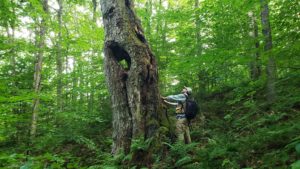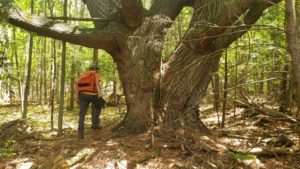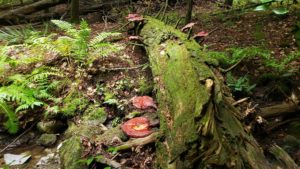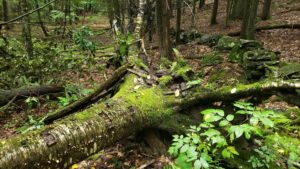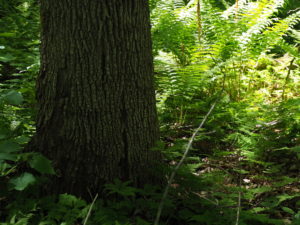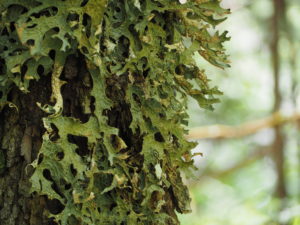Old Forest Ecology

Instructor: Shelby Perry
July 29 - 30, 2023 | $285
Course size: 12 students
Financial support available (contact us)
P
rior to European colonization, the northeastern United States was a peopled wilderness: a vast and old forest stretched from the east coast to the great plains. Virtually every native species we know evolved to live in those conditions, and yet today only about 0.4% of the Northeast remains in old growth. Most forests today, even the most conservatively managed ones, often see harvesting equipment a couple times a century. This may sound like very little in “people time,” but in “tree time” that represents a disturbance regime orders of magnitude greater than the forests evolved with. We’re so used to this reality that we forget what once was. Old forests hold many secrets– some that might be key to solving the climate and biodiversity crises we now face.
The course will provide an introduction to old forests, including their forms, functions, and inhabitants. Each day will explore an old forest field site in Northern Vermont, combined with time back at NBNC to share slides and discuss concepts in a classroom setting. We’ll decide whether an old forest needs to have old trees, and in what circumstances they might not. We’ll explore recently published scientific literature working towards revealing their mysteries. We’ll discuss the tools that conservationists use to protect our remaining old forests, and some of the new technology being used to locate them. And we’ll explore the basics of carbon accounting, tree measurements, and consider what we might be getting wrong when we look at carbon statistics.
Course Goals & Objectives
- Learn to identify indicators of old forests and old forest processes at work
- Discuss the differences between forests managed for timber and old forests
- Explore some of the tools used to locate remaining patches of old forest
- Practice measuring trees and understanding how carbon is calculated, including some of the drawbacks to these models
- Explore the recent scientific literature and ongoing work aimed at better understanding old forests
- Discuss the different tools used to protect existing old forests, and provide for the development of new ones
About the Instructor
Shelby Perry is an ecologist and naturalist specializing in old and wild forests. She works as Wildlands Ecologist at Northeast Wilderness Trust, and spends her days mapping natural communities, looking for old forests, measuring trees, and learning from her wild kin, from the largest trees to the tiniest slime molds.
Shelby joined the Wilderness Trust in 2016 with a B.S. in Environmental Engineering from Rensselaer Polytechnic Institute, a master’s degree from the University of Vermont’s Field Naturalist Program, and a deep love and respect for wild places. She had previously spent two years documenting and advocating for wilderness in Wyoming’s Red Desert, and served terms in both AmeriCorps and the US Peace Corps. When not working in old forests, Shelby can usually be found playing in them. She enjoys exploring wild places on foot and through photography, science, and artwork.
Physical Requirements
Participants must be able to travel several miles each day on uneven, potentially steep terrain off-trail. Given the nature of old forests, participants can expect to be navigating fallen logs and similar obstacles. Participants should be comfortable outside in potentially cold or wet conditions for long periods of time. Please reach out to us if you have any questions about mobility and/or other accessibility needs.
Recommended Reading
- A quick and easy read, this article from Smithsonian Magazine about Bob Leverett gives a great overview of some of the recent work around old forests and carbon. https://www.smithsonianmag.com/science-nature/the-old-man-and-the-tree-180979242/
- A deeper and more scientific dive into the value of letting forests grow, this proforestation paper distills recent findings on the values of unmanaged forests for recreation, carbon storage, and human health. https://www.frontiersin.org/articles/10.3389/ffgc.2019.00027/full?te=1&nl=climate-fwd:&emc=edit_clim_20200328
- Browse NEWT’s Library of Wild Works papers, literature reviews covering the topics of carbon and biodiversity in old forests. https://newildernesstrust.org/about/wild-works/
- This MassWoods report called Restoring Old-Growth Characteristics does a great job describing the structures and functions that make old forests important, and outlines some steps for restoring them. At the link there is both a PDF of the report and a webinar that you can watch. https://masswoods.org/caring-your-land/restoring-old-growth-characteristics
Meals
We will provide coffee, tea, and light breakfast fare (pastries, etc.) each morning. Participants should bring their own lunches and snacks.
Timing
Course begins 9 AM on Saturday at North Branch Nature Center. Course begins on Sunday at a time of the instructors' choosing. Course concludes by 5 PM on Sunday. There may be an optional evening lecture component, TBD.
Academic Credit / Professional Development
This course may qualify for 1 graduate-level credit for an additional $200 course fee. All BioU courses are accredited by Castleton University. Participants interested in receiving credit must contact us at least 2 months in advance so we have time to arrange course accreditation.
It is the student’s responsibility to ensure that home institutions will accept the credit. Participants pursuing academic credit will be required to complete an additional assignment above and beyond the course hours, including literature review, reflective writing, or a field-based project.
This course qualifies for 20 hours of professional development hours and continuing education units. Certificates of completion are provided at the conclusion of the course.
Cancellation Policy
While we realize that unexpected circumstances arise that are out of our control, North Branch Nature Center cannot guarantee refunds for registrations cancelled within 30 days of the course. If a cancellation occurs within this window, NBNC will attempt to fill the space from our wait list and provide a full refund. If the course needs to be cancelled by NBNC, we will provide a full refund.

713 Elm Street
Montpelier, Vermont 05602
(802) 229-6206
Hours: Center Open Monday-Friday 9-4
Trails Open 24/7

